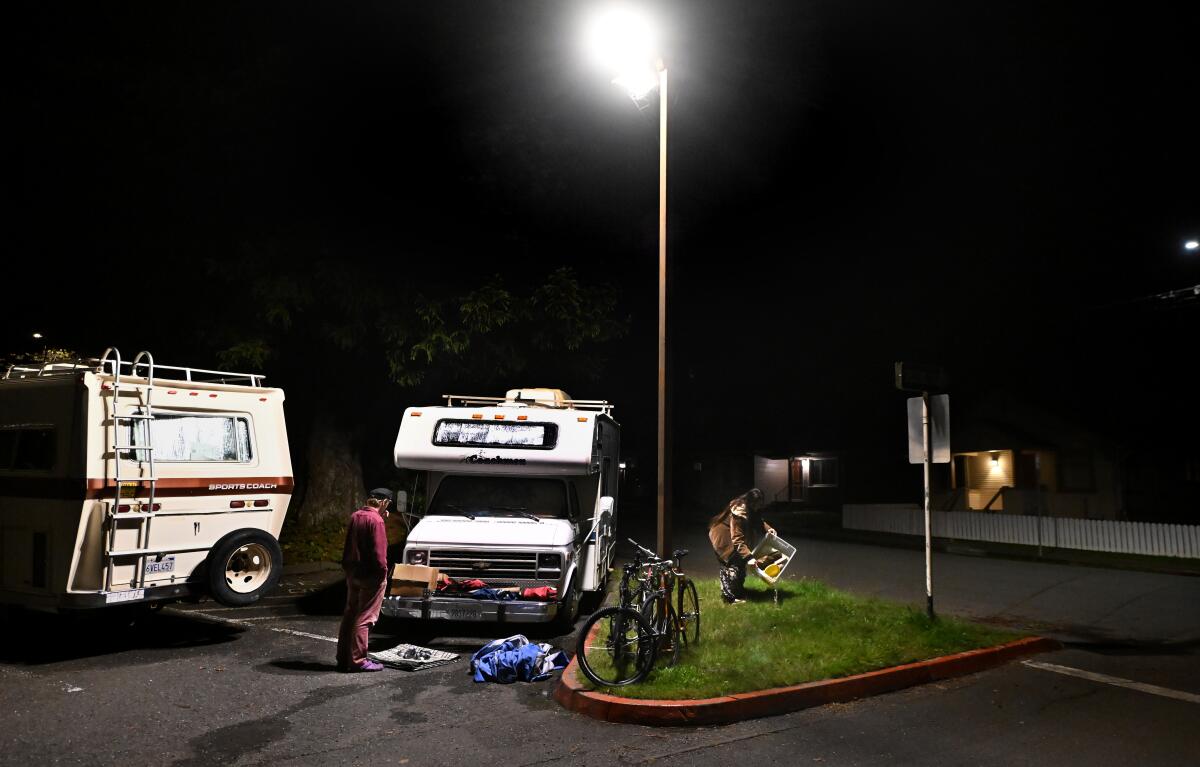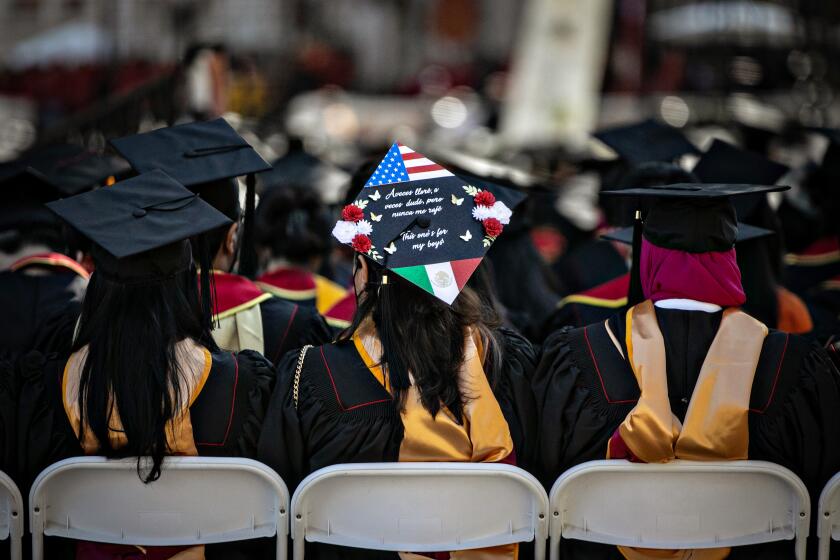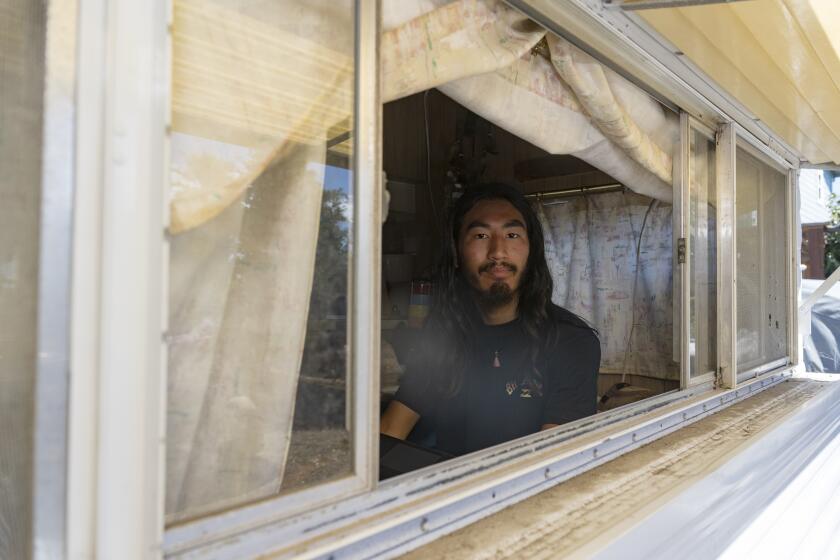Editorial: Homeless college students just need safe overnight parking. How tough can that be?

- Share via
Two years ago, Long Beach City College officials decided they had to do something to help homeless students who lived out of their cars, at least until it could find housing for them. So the school set up a safe parking program.
The program lets students stay in their vehicles from 10 p.m. to 7 a.m. in a parking structure across from the campus’ public safety building, with easy access to the security staff. The gate to the structure is locked after 10 p.m. so that no outsiders can enter to harass or steal from the overnight residents. Any student, even one taking a single class, qualifies for an overnight permit.
No one thinks that permission to sleep in a car is the ultimate solution to unaffordable housing. But a 2020 study by UCLA found that one in five community college students had experienced homelessness at some point in the previous year. Overnight parking provides at least temporary support for homeless students, many of whom are juggling jobs with their course loads.
Universities were never meant to be merely career-prep schools. But more universities are shrinking non-STEM departments.
The Long Beach program hands out inflatable mattresses for students to use in their vehicles, personal hygiene products and gift cards for purchasing food. Students have access to Wi-Fi, laundry, a bathroom and showers in the athletic building. And it’s costing the college less than $80,000 a year. There have been no significant disciplinary or safety problems, said Mike Muñoz, the college’s superintendent-president.
Sounds pretty simple and inexpensive. In a state where housing costs are high and many students are in financial need, you’d think programs like LBCC’s would be widely copied. Instead, it is a rarity.
It shouldn’t be. This is a model that officials at other public and private colleges ought to consider.
The strife on campuses over the Israel-Gaza war comes amid a culture of outrage over issues. Universities should convene open discussion, not take sides.
Long Beach City College doesn’t just provide homeless students a safe place to sleep. It works actively to find them stable housing. “Our goal is not to have students sleep in their cars,” Muñoz said. About 24 students started the 2022 academic year in the college’s Safe Parking program. By spring, half had been placed in affordable housing. This school year, the college started out with 17 students living out of vehicles.
Coincidentally, 17 or so students at Cal Poly Humboldt also lived out of their cars in a campus parking lot this semester. But, the school’s reaction was completely different. It ticketed them and told them to move off campus. They were offered a free stay in a campus dorm or at a camping facility in town, but only through the end of December.
One in five California community college students, one in 10 California State University students and one in 20 University of California students are homeless, a study found.
Humboldt officials said the collection of vehicles represented a safety hazard for the students and a health hazard for the campus because of trash left around the area. If that’s true, the college should have taken steps to make them safer, such as putting out trash collection bins and installing chemical toilets and setting some ground rules for conduct.
Homelessness has come to California’s public colleges, just as it has to every other institution in the state.
Frank Whitlach, Cal Poly Humboldt’s vice president for university advancement, said the school lacks the resources and expertise to provide safe parking lot space and oversight for its homeless students. He said the college tries to help students in need with, for example, a robust food bank program. But in the matter of overnight parking, he noted, Humboldt is in line with just about all the college campuses in California.
But the failure of California’s colleges and universities to help unhoused students is a shame, not an excuse. Further, it’s clear from the small numbers of students using the Long Beach parking structure that college officials needn’t worry about their campuses being overwhelmed with homeless encampments.
“This isn’t something that students want to do,” said Assemblymember Marc Berman (D-Menlo Park). It’s apparently not something most colleges want to do, either. When Berman introduced legislation in 2019 that would have required community colleges to offer overnight parking for the vehicles of unhoused students, it set off a wave of opposition among the public colleges.
The legislation was admittedly too rigid, and then was so badly weakened through amendments that Berman withdrew it. But if colleges won’t figure out solutions without prodding, Berman should consider authoring a new bill that requires most public colleges and universities to create overnight parking programs, with safety and behavior rules. No tent encampments. Just a safe place to park a car, with a few essential amenities.
Last year, The Times profiled a UC Santa Cruz student who spent $750 a month to park his used trailer in a private driveway. Imagine the weight that would have been lifted from his shoulders if that parking space had been free or very low cost.
It’s time for college officials to shed their “It can’t be done” attitude toward students who live out of cars and change their thinking to “How can it be done?”
More to Read
A cure for the common opinion
Get thought-provoking perspectives with our weekly newsletter.
You may occasionally receive promotional content from the Los Angeles Times.













